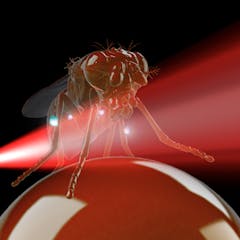
Articles on Neuroscience
Displaying 601 - 620 of 688 articles

Despite long standing associations with mysticism and stage hypnotism, hypnosis has also been used for medical and scientific purposes. For well over a century, hypnosis has been used to treat a wide range…

Is sex addiction real? That is, is it really a disorder, involving diminished control over behaviour? Questions such as these are difficult to answer because it’s always difficult to distinguish diminished…

Researchers in Japan have used the powerful K computer, one of the world’s fastest supercomputers, to simulate the complex neural structure of our brain. Using a popular suite of neuron simulating software…

If you’ve ever been frustrated by erratic memories, spare a thought for the mice involved in a study published in the journal Science. Researchers have been able to consistently create a “false memory…

An American neuroscientist claims to have solved the problem of free will. Peter Tse, who works at Dartmouth College in New Hampshire, says that the key to free will lies in how neurons can rewire each…
A brain imaging study conducted by researchers from the University of Queensland has shown how human brains use a “divide…

In the past few days, a great deal of media attention has been paid to Leanne Rowe, a Tasmanian woman who has lived eight years with a French accent she acquired after a car accident. This phenomenon is…

Researchers have used the radioactive fallout from atomic bomb tests to show that new neurons are produced in one part of the human brain throughout life. Studies have shown that rats can grow new neurons…

After many years of research, we still do not completely understand the brains of even the simplest organisms. The human brain with its 80 billion neurons is largely a mystery. But with better tools we…
The brains of people diagnosed with depression are less adaptable to their environments, a study emerging from Neuroscience…

Brains are smart enough to rewire themselves, a new international study of rats has found. The study turns on its head the common misconception brain damage is irreversible, showing the precise neural…

Deep brain stimulation (DBS) is a remarkable therapeutic innovation that has restored the lives of many individuals with intractable neurological disorders. Nowhere is this more evident than in crippling…
The biological function of sleep is to allow vital repair and maintenance of the neurons in the brain, researchers at University…

Certain types of long term memories can be “rewritten” without drugs or surgery, according to a new study that experts say offers hope for sufferers of post traumatic stress disorder. The study, conducted…

Have you ever noticed that even detailed, sophisticated virtual reality experiences don’t feel completely “real”? It all comes down to your inner ear - and a study published earlier this month using rats…

Neurological disorders can have a devastating impact on the lives of sufferers and their families. Symptoms of these disorders differ extensively - from motor dysfunction in Parkinson’s disease, memory…

There’s nothing quite like overhearing a hearty belly-laugh, unless perhaps it’s having a good chortle yourself. The happy likelihood is that, in any case, one guffaw will lead to the other. Laughter is…

A research centre where experts will use the latest findings from neuroscience, education and psychology to better understand how students learn will open this year, after the Australian government announced…

Think of your favourite magic trick. Is it as grandiose as David Copperfield’s Death Saw, or is it as simple as making a coin disappear in front of your very eyes? These two very different tricks have…

Scientists have found a way to control the reward centre of the brain, using a miniature wireless device that emits light and causes the brain to release dopamine, the chemical associated with pleasure…
